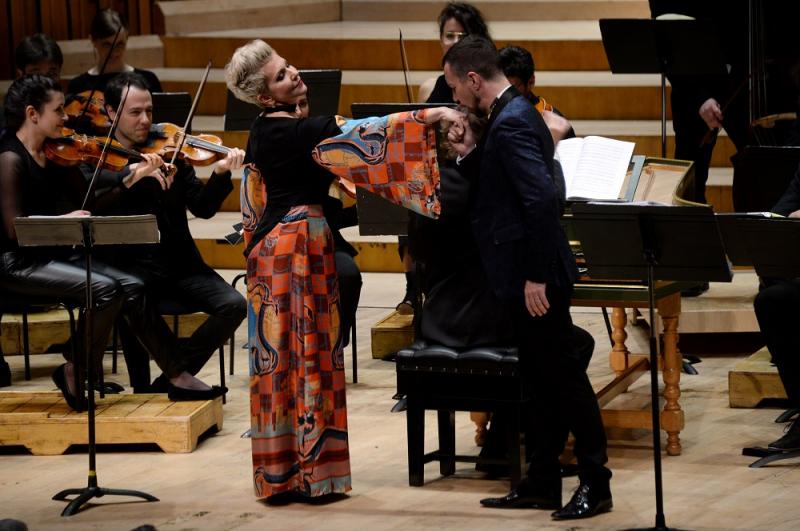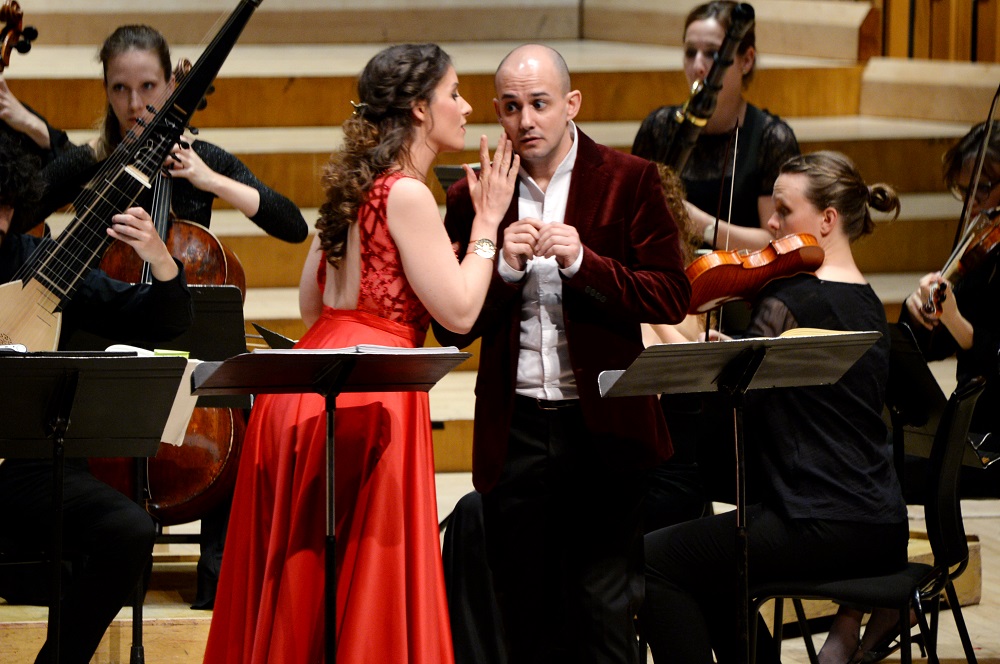Agrippina, Barbican review - over-the-top comic brilliance | reviews, news & interviews
Agrippina, Barbican review - over-the-top comic brilliance
Agrippina, Barbican review - over-the-top comic brilliance
Handel's Roman comedy gets a bit Carry On Up The Capitol

Flirtations and fragile alliances, lies, betrayals, schemes and the ever-present promise of sex – Love Island may be back on our screens next week, but it has nothing on Handel's Agrippina. Imperial Rome is the backdrop for one of the composer’s most deliciously cynical comedies, where love is an afterthought and power is the only game in town.
Agrippina is the original tiger mother, conniving to put the Imperial laurel wreath on her son Nero’s head. Kingmaker, ringmaster, seductress, éminence grise – it’s a gift of a role, and one seized with both hands by mezzo Joyce DiDonato, the raison d’être of this touring concert staging by Il Pomo d’Oro. Already seen in Madrid, Paris, Luxembourg and Barcelona, it arrives at the Barbican as a slick and seriously shiny package, albeit not perhaps quite the one originally promised.
Three of the eight cast members are late substitutes for those originally advertised (no Lemieux, Orlinski or Lewek), but there’s nothing second-string about the final line-up. DiDonato dominates, radiating star-power, but there’s plenty of counter-weight in Franco Fagioli’s grotesque Nero, Xavier Sabata’s sweetly sincere Ottone, Luca Pisaroni’s Claudio and Elsa Benoit’s minx of a Poppea (pictured below with Fagioli).
 No director is credited for a semi-staging that does as much as it can – perhaps a little too much – behind the scaffolding of scores and music stands. DiDonato made it clear from her first entry that this political drama is to be played for laughs, and the audience responded enthusiastically. But somewhere between DiDonato ruffling conductor Maxim Emelyanychev’s hair and directing her own accompaniment with flamboyant wrist-flicks and Fagioli’s physical clowning as Nero things reach a level of camp that’s hard to come back from dramatically. In some ways it’s a brilliant trick, baiting the trap with plenty of easy laughs before sending it slamming shut with Agrippina’s shattering “Pensieri, voi mi tormentati”, but it’s one that risks distorting the humanity that Handel always finds in his subjects, however twisted and corrupted.
No director is credited for a semi-staging that does as much as it can – perhaps a little too much – behind the scaffolding of scores and music stands. DiDonato made it clear from her first entry that this political drama is to be played for laughs, and the audience responded enthusiastically. But somewhere between DiDonato ruffling conductor Maxim Emelyanychev’s hair and directing her own accompaniment with flamboyant wrist-flicks and Fagioli’s physical clowning as Nero things reach a level of camp that’s hard to come back from dramatically. In some ways it’s a brilliant trick, baiting the trap with plenty of easy laughs before sending it slamming shut with Agrippina’s shattering “Pensieri, voi mi tormentati”, but it’s one that risks distorting the humanity that Handel always finds in his subjects, however twisted and corrupted.
DiDonato is on commanding form – volleys of coloratura clean as rifle-fire, her “Pensieri” a tragic soliloquy of Shakespearean scope and weight. There’s nothing spontaneous about a performance in which every inflection and gesture has been meticulously thought and planned and honed; it’s both blessing and curse, enabling complete technical security while occasionally (“Ogni vento”) becoming over-worked.
 In Fagioli and Sabata she is flanked by two contrasting voices and personalities. There are no sharp edges on Sabata’s baroque flute of a countertenor. Soft-grained and woody it makes for an exquisite “Vaghe fonti”, duetting delightfully with the two solo recorders, Emelyanychev adding trickling springs to his inventive accompaniment. Where Sabata is creamy smooth, Fagioli’s voice has an acid kick to it, a sting that projects sharp and bright. It’s an astonishing instrument – agile and with a seemingly limitless range – but not everyone will love what he does with it. Chewing each phrase in his mouth, gurning with visible effort, he turns mummy’s boy and pawn Nero into a grotesque, pleasure-seeking panto-villain. It’s supremely entertaining, but not the subtlest of takes.
In Fagioli and Sabata she is flanked by two contrasting voices and personalities. There are no sharp edges on Sabata’s baroque flute of a countertenor. Soft-grained and woody it makes for an exquisite “Vaghe fonti”, duetting delightfully with the two solo recorders, Emelyanychev adding trickling springs to his inventive accompaniment. Where Sabata is creamy smooth, Fagioli’s voice has an acid kick to it, a sting that projects sharp and bright. It’s an astonishing instrument – agile and with a seemingly limitless range – but not everyone will love what he does with it. Chewing each phrase in his mouth, gurning with visible effort, he turns mummy’s boy and pawn Nero into a grotesque, pleasure-seeking panto-villain. It’s supremely entertaining, but not the subtlest of takes.
Pisaroni is an anchoring presence as Claudio, generating real heat in his lustful cavatina “Vieni o cara”, and well matched in Elsa Benoit’s schemer-in-training Poppea. There’s strong comic support and a fine handful of arias from countertenor Carlo Vistoli (Narciso) and bass Andrea Mastroni (Pallante). Il Pomo d’Oro are all zesty bite and attack under Emelyanychev’s demonstrative direction – brilliantly entertaining and just slightly over the top, like everything else about this performance.
The future of Arts Journalism
You can stop theartsdesk.com closing!
We urgently need financing to survive. Our fundraising drive has thus far raised £49,000 but we need to reach £100,000 or we will be forced to close. Please contribute here: https://gofund.me/c3f6033d
And if you can forward this information to anyone who might assist, we’d be grateful.

Subscribe to theartsdesk.com
Thank you for continuing to read our work on theartsdesk.com. For unlimited access to every article in its entirety, including our archive of more than 15,000 pieces, we're asking for £5 per month or £40 per year. We feel it's a very good deal, and hope you do too.
To take a subscription now simply click here.
And if you're looking for that extra gift for a friend or family member, why not treat them to a theartsdesk.com gift subscription?
more Opera
 Tosca, Welsh National Opera review - a great company reduced to brilliance
The old warhorse made special by the basics
Tosca, Welsh National Opera review - a great company reduced to brilliance
The old warhorse made special by the basics
 BBC Proms: The Marriage of Figaro, Glyndebourne Festival review - merriment and menace
Strong Proms transfer for a robust and affecting show
BBC Proms: The Marriage of Figaro, Glyndebourne Festival review - merriment and menace
Strong Proms transfer for a robust and affecting show
 BBC Proms: Suor Angelica, LSO, Pappano review - earthly passion, heavenly grief
A Sister to remember blesses Puccini's convent tragedy
BBC Proms: Suor Angelica, LSO, Pappano review - earthly passion, heavenly grief
A Sister to remember blesses Puccini's convent tragedy
 Orpheus and Eurydice, Opera Queensland/SCO, Edinburgh International Festival 2025 review - dazzling, but distracting
Eye-popping acrobatics don’t always assist in Gluck’s quest for operatic truth
Orpheus and Eurydice, Opera Queensland/SCO, Edinburgh International Festival 2025 review - dazzling, but distracting
Eye-popping acrobatics don’t always assist in Gluck’s quest for operatic truth
 MARS, Irish National Opera review - silly space oddity with fun stretches
Cast, orchestra and production give Jennifer Walshe’s bold collage their all
MARS, Irish National Opera review - silly space oddity with fun stretches
Cast, orchestra and production give Jennifer Walshe’s bold collage their all
 Káťa Kabanová, Glyndebourne review - emotional concentration in a salle modulable
Janáček superbly done through or in spite of the symbolism
Káťa Kabanová, Glyndebourne review - emotional concentration in a salle modulable
Janáček superbly done through or in spite of the symbolism
 Buxton International Festival 2025 review - a lavish offering of smaller-scale work
Allison Cook stands out in a fascinating integrated double bill of Bernstein and Poulenc
Buxton International Festival 2025 review - a lavish offering of smaller-scale work
Allison Cook stands out in a fascinating integrated double bill of Bernstein and Poulenc
 Tosca, Clonter Opera review - beauty and integrity in miniature
Happy surprises and a convincing interpretation of Puccini for today
Tosca, Clonter Opera review - beauty and integrity in miniature
Happy surprises and a convincing interpretation of Puccini for today
 Hamlet, Buxton International Festival review - how to re-imagine re-imagined Shakespeare
Music comes first in very 19th century, very Romantic, very French operatic creation
Hamlet, Buxton International Festival review - how to re-imagine re-imagined Shakespeare
Music comes first in very 19th century, very Romantic, very French operatic creation
 Falstaff, Glyndebourne review - knockabout and nostalgia in postwar Windsor
A fat knight to remember, and snappy stagecraft, overcome some tedious waits
Falstaff, Glyndebourne review - knockabout and nostalgia in postwar Windsor
A fat knight to remember, and snappy stagecraft, overcome some tedious waits
 Salome, LSO, Pappano, Barbican review - a partnership in a million
Asmik Grigorian is vocal perfection in league with a great conductor and orchestra
Salome, LSO, Pappano, Barbican review - a partnership in a million
Asmik Grigorian is vocal perfection in league with a great conductor and orchestra
 Semele, Royal Opera review - unholy smoke
Style comes and goes in a justifiably dark treatment of Handelian myth
Semele, Royal Opera review - unholy smoke
Style comes and goes in a justifiably dark treatment of Handelian myth

Add comment